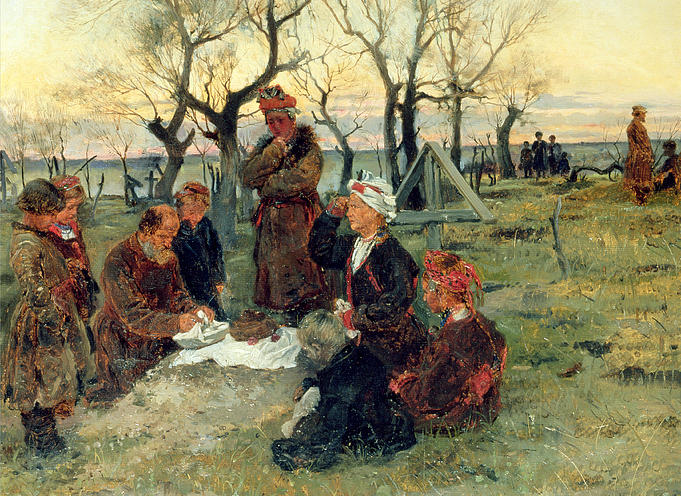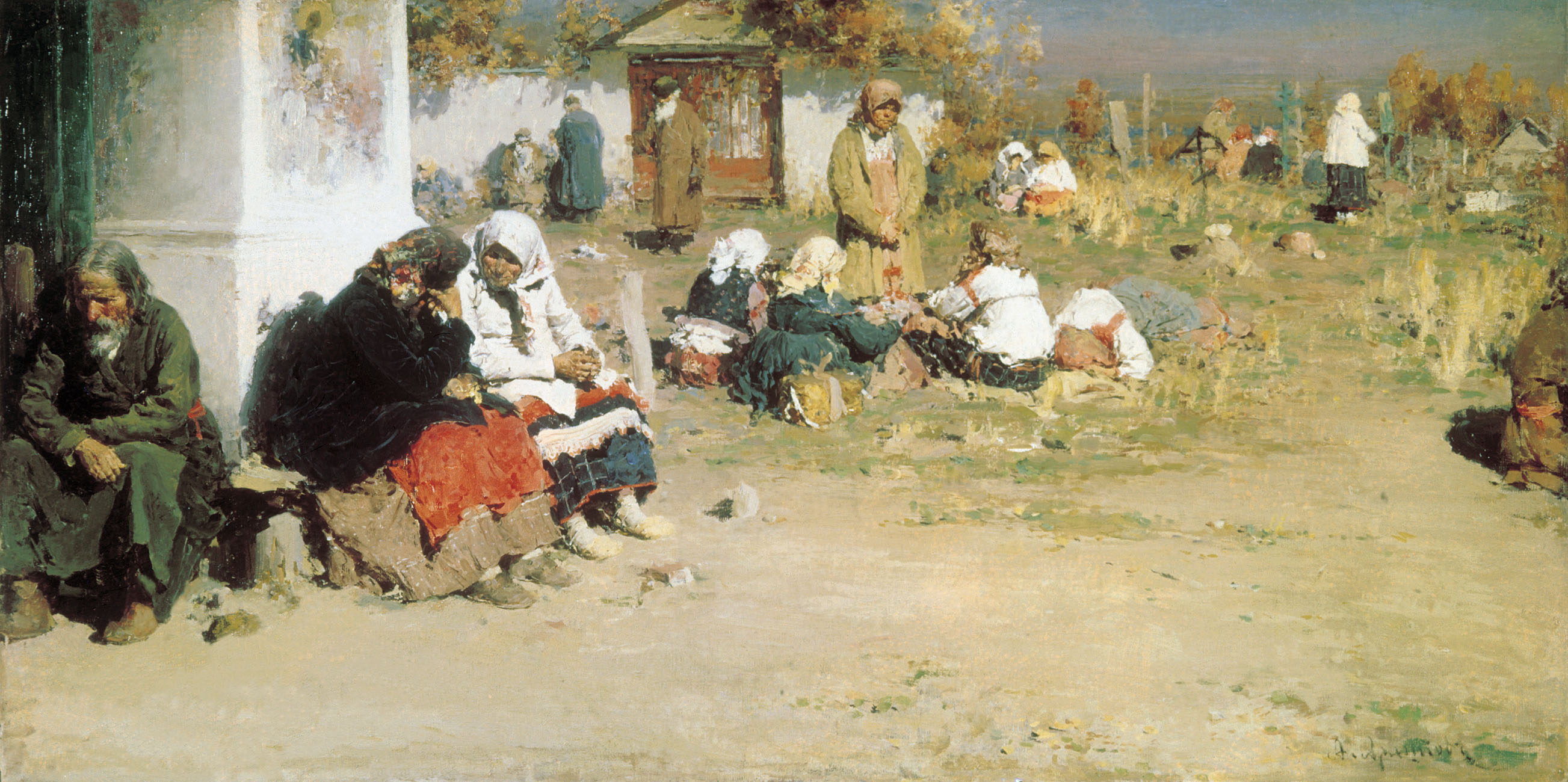
Commemoration of the dead is one of the obligatory elements of liturgical practice in the Orthodox Church. Prayer for the dead is celebrated both on the day of special remembrance and during the morning prayer at home every day. The Christian custom of praying for the dead was very well received by our ancestors, since the cult of the dead has been widespread in pagan times since Ukraine. Over time, Ukrainian folk traditions have been mixed with Christian rites, and as a result, we now have a great deal of prejudice associated with the commemoration of the dead. How, then, is it proper to remember the dead in the church? This is what our material will tell us today.
Scripture states that God does not have dead, but all alive, just being in different worlds. Those people who have already died and departed from us are not abandoned by the Lord, but on the contrary constitute the Heavenly Church (community), while we, living people, constitute the Church of the Earth. The only connection between the earthly and heavenly churches is prayer, because as we pray for our dead relatives, they pray for us while in another world. The prayer for the dead is important in that through it we can influence the posthumous fate of our dead loved ones, because, according to Christian doctrine, a posthumous judgment on every soul is not final. The final decision will be on the Last Judgment after the Second Coming of Christ.
The Church offers us two basic methods of commemorating the dead: constant prayer and good works, including almsgiving. You can also pray for your dead relatives at home during daily prayer, but it is especially important to pray together in the church during the Liturgy. After all, the whole church community prays for worship. In addition, if you have filed a note to the altar, the priest will remove from the prosphora a piece for your departed relatives and at the end of the liturgy, drop it into the chalice with the Holy Gifts, along with other pieces. During this action he will pray: “Wash the sins of all those commemorated by me”. 
Alms, as a manifestation of good works, are also recommended to commemorate the dead. It can be clothing or food that you give out to a person asking for prayer. Vodka or other alcoholic beverages cannot be distributed even as alms. The only exception is the red wine, which along with flour and oil, is brought to the temple on a funeral table. Why these products and wine? Because they are necessary to perform the liturgy: oil and flour go to baking prosphoras, wine is poured into the chalice. We should also talk separately about the tradition of bringing food to the cemeteries or generally having funeral meals and alcohol at the graves of the dead. This way of "remembrance" of the dead has no Christian basis and is a continuation of the traditions of pagan feasts that existed in ancient Slavs. The very nature of such remembrances bears no respect for the dead or some spiritual content. Usually, it just turns into a booze on the graves, with all the consequences.
In the liturgical charter of the Orthodox Church, the day of commemoration of the dead is Saturday. But apart from the regular Saturdays, there are separate Saturdays during a year, when special commemorative services or parastas (from the Greek parastas - request) are performed. These Saturdays are called "Father's Saturdays" and their completion is tied to Lent and the period before and after it. They include:
1. Meatless Saturday or the Saturday before the Sunday of the Last Judgment, the third preparatory week before Lent. On this day, before the remembrance of the Lord's deciding judgment, a prayer is made for all Christians who have died, and a special request is made to forgive all their sins, both conscious and unconscious.
2. Trinity Saturday is the Saturday before the feast of the Holy Trinity (Pentecost), that is before the 50th day after Easter. As the Pentecost is the birthday of the Church of Christ, of which the dead are part, they are prayerfully remembered during this funeral service.
3. The second, third, and fourth Saturdays of Lent. Particular funeral services were set up these days of fasting, as few full liturgies are performed at this time, which include commemoration of the dead.
In addition, there are two more days in Ukraine when funeral services are performed, but which are not on the calendars of most Orthodox churches in the world. Both of these days are connected with the above-mentioned ancient Slavic customs of commemoration of the dead in the spring and autumn, which in Ukraine are called: "accompaniments", "tombs" or "grandparents". In the spring, it is the ninth day after Easter – Radonitza. And in the autumn the Dmitry’s Saturday - the Saturday before the memory of the Great Martyr Demetrius of Thessaloniki (November 8). After Christianity was adopted by our ancestors, the Church tried to Christianize the entire set of local traditions and customs. That is why in the traditional Slavic commemorative days, church funeral services were set up to convert newly Orthodox to worship in temples rather than go to cemeteries to eat and drink.
As we can see, in the case of the "Autumn Grandfathers" – Dimitry’s Saturday it worked, and this day is now regarded exclusively with the church’s commemoration. But it was not so easy with Radonitsa. The name "Radonitsa" is still pagan, although it is now interpreted as the embodiment of Easter joy. Radonitsa is the day that the cemeteries are massively visited by Ukrainians for remembering the dead. Some still have funeral dinners right near the graves of dead relatives. However, the echoes of the recent feast of the Resurrection of Christ have also reached this day, because as a commemorative meal for the alms, the mistress bake Easter cakes. Therefore, we hope that over time more and more people will understand the inappropriateness of eating and drinking (especially alcohol) in cemeteries.
Thus, seven days a year, in the tradition of the Orthodox Church, there are the days of special remembrance of those who have been laid to rest, where special funeral services are performed everywhere. But this does not mean that we should pray for the dead relatives only these days. I the morning prayer there is a special prayer for the dead. We especially mention the departed in the prayer on the anniversary of their death. Keep in mind that prayer, almsgiving, and other good deeds are not tied to the calendar, as they are useful not only for the dead, but also for us on our journey to excellence and salvation.




